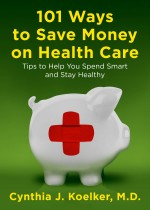
- Image via Wikipedia
Heartburn. Also known as acid reflux, GERD, acid indigestion. By now all the talk of healthcare reform has probably given you a case of it.
Are you one of the estimated 10% of Americans who suffer from acid reflux disease? There wouldn’t be so many commercials on the “Purple Pill” if there weren’t millions of you out there.
Heartburn is the most common symptom of acid reflux disease. However, it is not the only symptom. Some people experience chest pain, or abdominal pain. Others complain of cough or sour taste in their mouths. A few have wheezing, hoarseness, nausea, or regurgitation.
How can a person save money on heartburn?
The easiest place to start is by avoiding triggers. Food, alcohol, smoking, medications, and stress are the most common culprits. Avoid spicy foods, acid foods such as tomato products and citrus, onions, caffeine, and dare I say it, chocolate? Avoid eating late in the evening. Don’t smoke. Don’t drink. Listen to your mother.
Most people are aware aspirin can cause acid indigestion. Many are unaware that ibuprofen (Motrin®, Advil®) and naproxen (Aleve®) are nearly as likely to do so. Prescription anti-inflammatory drugs are also triggers, although Celebrex® is probably least likely to cause heartburn conditions. Some people have similar trouble with other medications such as corticosteroids or hormones.
If you avoid known triggers but still have symptoms, how can you save money on treatment?
(Before I go on, let me say that on-going heartburn may be a symptom of ulcer disease, heart disease, or even cancer. Consult your doctor to make sure you’re OK.)
Back to saving money on treatment.
There are three types of heartburn medications: antacids (which neutralize stomach acid on contact for immediate relief), the H2-blockers (such as Tagamet®, Axid®, Pepcid®, and Zantac®), which decrease stomach acid production on the order of 50%, and the PPIs (proton-pump inhibitors) (Prilosec®, Prevacid®, Aciphex®, Protonix®, Nexium®, Kapidex®), which decrease acid on the order of 90%. Reglan® is in another category entirely, and works by improving contractions in the esophagus, so the acid is moved back into the stomach.
For occasional heartburn, say once a week or less, don’t spend $20 on Prilosec OTC®. Buy a $5 bottle of Rolaids® or Maalox® (or better yet, generics) that should last several months.
For more frequent or resistant heartburn, the H2-blockers are an excellent and affordable choice. When they first came on the market they were miracle drugs – life-changing for ulcer-sufferers. At the time they were quite expensive. But now they are cheap, as little as $4 for a month’s supply. Tagamet, Axid, Pepcid, and Zantac are all available now over-the-counter in low dose. Interestingly, they are still available by prescription, generally in higher dose, but often at a lesser price than the OTC drugs. For example, you can buy a 30-day supply of generic Pepcid (famotidine) by prescription for only $4, whereas the OTC version can cost 2-3 times as much, depending on strength. It will probably cost less to get a prescription.
Many people, probably millions, who are taking the more expensive PPIs would do fine with the less expensive H-2 blockers. (Again, ask your doctor before taking these on a regular basis. You don’t want to mask stomach cancer.) Of the PPIs, Prilosec, Protonix, and most recently Prevacid are now generic. Prilosec and some forms of Prevacid are currently over-the-counter. If you have a formulary through your insurance, it is likely that these are regulated. Check your formulary (bring it with you to the doctor) before deciding on these drugs. It may save a lot of heartache.
- Image via Wikipedia
You don’t want to take the PPIs twice a day if at all possible – a higher dose once a day is nearly always cheaper. The generics are generally least expensive. Unlike the H-2 blockers, however, the OTC versions are less expensive than the prescription versions. Also, the most frequently prescribed dosages may cost less than less frequently prescribed dosages, regardless of pill strength. Ask your pharmacist. Though most of these preparations come as capsules and cannot be split like pills, the capsules that are safe to open and sprinkle onto applesauce or other food could be carefully divided in half for further savings. Coupons for brand-name PPIs (up to $55 off) are available online or from your doctor. Check online at: www.purplepill.com/tools/index.aspx, http://www.dexilant.com/, and http://www.aciphex.com/.
Reglan (metoclopramide) is not used as frequently as in past years, but it is highly effective for many people. It comes only by prescription, but costs as little as $4/month. It can be combined with an H-2 blocker if needed, which would still cost less than a PPI. Some people experience side-effects, but not usually with low-dose or intermittent use.
Hopefully this saves some of you big bucks on heartburn relief. Happy savings!
Potential annual savings on heartburn: $1 to $100 x 30,000,000 Americans = $30,000,000 to $3,000,000,000
Actual savings: Readers, let me know. Please share your success stories or ideas to help others by sending an email to: info@101waystosavemoneyonhealthcare.com
If you found this article helpful and would like to accelerate your savings, check out my book, 101 Ways to Save Money on Healthcare, available online, in libraries, and through bookstores everywhere.
© Cynthia J Koelker, MD – All Rights reserved
Related articles by Zemanta
- Gastroesophageal reflux disease – All Information (umm.edu)
- Heartburn – All Information (umm.edu)
- What can I do about my heartburn? (cnn.com)



